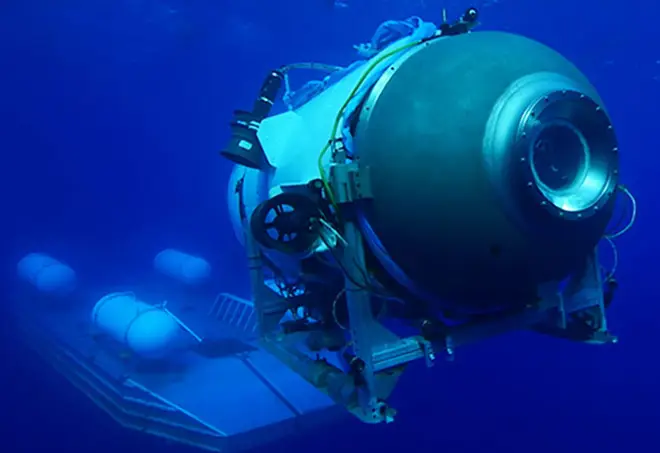
Ian Payne 4am - 7am
22 June 2023, 12:11 | Updated: 22 June 2023, 14:01

The missing Titanic submarine is feared to have run out of oxygen, according to rescuers' estimates.
The submersible Titan, which was taking five passengers down to see the wreck of the famous passenger liner, vanished earlier this week and it was estimated to have 96 hours of oxygen.
It disappeared while venturing to the ship on Sunday, which is 400 miles off the coast of Newfoundland, in the Atlantic, and some 12,000ft below the surface.
It was thought the oxygen could run out at 7.08am local time according to Coast Guard estimates.
"We have to remain optimistic and hopeful when we are in a search and rescue case," Coast Guard captain Jamie Frederick said on Wednesday.
"If we continue to search, potentially we could be at that point... And that's a discussion we will have with the families long before I am going to discuss here publicly."
He added: "We always have hope - that's why we're doing what we do."


A ship tracking website showed heavy activity as vessels scour the area for any sign of the cramped sub, owned by OceanGate Expeditions. Sonobuoys have been dropped to listen for the Titan.
British billionaire Hamish Harding is aboard, as are Paul-Henri Nargeolet, a French explorer, Shahzada Dawood, a UK-based Pakistani businessman who is a board member of the Prince's Trust charity, his 19-year-old son Suleman Dawood, who it has been confirmed attends Strathclyde University in Glasgow, and Stockton Rush, the CEO of OceanGate.
It is hoped they will have tried to relax and conserve energy so as not to waste precious supplies of oxygen.
Guillermo Sohnlein, who founded OceanGate with Mr Rush in 2009, said they could live past the Coast Guard's estimates of oxygen supply.
"Today will be a critical day in this search and rescue mission, as the sub's life support supplies are starting to run low," he said.
"I'm certain that Stockton and the rest of the crew realised days ago that the best thing they can do to ensure their rescue is to extend the limits of those supplies by relaxing as much as possible.

"I firmly believe that the time window available for their rescue is longer than what most people think. I continue to hold out hope for my friend and the rest of the crew."
As oxygen levels in the 6.7 metre long vessel fall, more carbon dioxide will be in the atmosphere because the five passengers have been exhaling.
Carbon dioxide poisoning can cause asphyxiation or hypercania, a condition where too much gas is in the bloodstream.
Dr Ken Ledez, a hyperbaric medicine expert at Memorial University in St John's, Newfoundland, said: "As levels of carbon dioxide build up, then it becomes sedative, it becomes like an anaesthetic gas, and you will go to sleep."
Once the level of carbon dioxide in someone's blood is higher than 10%, they are likely to die quickly.
People can live for about 15 minutes without oxygen, though they lose consciousness long before then.
They are likely to suffer brain damage after just a few minutes without air.
If the sub is very deep down, the temperatures could be extremely cold.

But this could be an advantage, Dr Ledez said.
"There is a possibility if they cool down enough and lose consciousness they could live through it - rescuers know this," Dr Ledez he told the BBC.
The rescue operation has not been called off. A French ship, L'Atalante, has used the Victor 6000, a robot sub that can go as low as 20,000ft.
It has arms that could attach a cable to the sub that could bring it back to the surface.
But it has not even been located yet. Hopes that banging noises could lead rescuers to the vessel have not led to any results.
Updates to follow